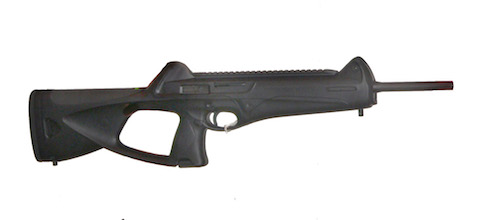The Pistol Caliber Carbine: the gun tactical hobbyists love to hate

For some time I’ve championed the pistol caliber carbine (PCC) as a home and family defense tool. Every time I mention the things, however, I get emails and Facebook messages from the hobbyists who can’t see the forest for the trees.
They’re almost boringly similar: “Why put up with the size and weight of a rifle just to shoot a pistol round?” “If you’re going to the trouble, it’s stupid not to have the power.” Why all the hate?
What is a PCC?
The pistol caliber carbine is, as its name implies, a short, light, handy rifle that shoots what is normally considered a pistol round. Pistol caliber carbines are commonly chambered in 9mm and .45ACP, but you can also find them in .40S&W and they’ve also been produced in 10mm Auto.
When most people think of a ‘carbine’ they often think of autoloading rifles. The term was used to describe short rifles long before autoloading actions became available, and thus you can also find lever-action carbines chambered in revolver cartridges such as the .38 Special/.357 Magnum, .44 Magnum, and .45 Colt.
The ‘pistol caliber’ portion of the term is open to a little discussion. The famous .30 Carbine round, for instance, isn’t a handgun round (though handguns have been made in that chambering), but it’s also definitely not a rifle round. I consider the M1 Carbine to be part of the PCC family because its performance is very similar to others in the category.
Why the PCC?
As a home defense arm the PCC has a number of advantages over a handgun. To start, it has significantly greater precision capabilities than a pistol; the long sight radius and four points of body contact make the PCC much easier to shoot than any handgun. It’s usable out to distances that would require great skill with a handgun, and the PCC makes precision shots at closer distances almost child’s play.
The PCC is almost ridiculously easy to shoot. Except in the heaviest calibers, recoil is as close to non-existent as you get in an effective self defense caliber. Muzzle rise, likewise, is nearly absent. These two qualities make for a gun which almost anyone, regardless of skill, can keep on target in rapid fire.
If you have a concealed carry handgun you can get a PCC which uses the same ammunition, making logistics a little easier. The effectiveness of modern defensive handgun ammunition, coupled with the ease of putting multiple rounds into the target, makes the PCC a truly formidable defensive tool.
As a “pool” weapon, one which is likely to be used by several members of a family whose skill and dedication to shooting varies wildly, the PCC is almost ideal. No matter who is shooting, the PCC makes putting rapid, multiple, accurate rounds on target easy to do.
Why not a rifle?
This is where the tactical hobbyists start to go off the rails. They look at the PCC and see not its attributes, but only that it’s a “weaker” version of the rifles they love. To them, it makes no sense to have a rifle with less power. How valid is the point of view?
Let’s take a rifle in .223/5.56mm, which is by far the most popular chambering in carbine-sized rifles. Compared to a PCC, the rifle is going to have significantly more muzzle blast and more perceived recoil. The result is it’s more difficult to shoot and significantly more intimidating, and for those who aren’t “gun people” that intimidation factor makes the difference between a gun that’s fun to shoot and one which they avoid shooting.
The rifle magazines are larger and harder to manipulate; the ammunition is bigger and more expensive. It’s also one more purchase that has to be researched and remembered. This sounds silly to you and me, because we’re used to buying several different calibers. For the average person, the one who’s not a shooter or hobbyist, those are very real downsides.
What about effectiveness? Isn’t the rifle significantly more effective on a per-shot basis? That’s a good argument, but it all comes down to rounds on target. If someone is able to shoot the PCC better than they can a rifle (and, frankly, most people fall into that category) they’re likely to have a higher hit percentage. To paraphrase the old saying, a hit with a PCC is still better than a miss with a rifle!
The bottom line
What it comes down to is this: the PCC is an easier defensive firearm to live with for someone who’s not an avid shooter. Frankly, even for those of us who are experienced shooters, the PCC is a fun gun that can also be used as an effective self defense tool. At this stage of life I’ve lost track of how many thousands of rounds of rifle ammunition I’ve shot; it’s certainly measured in hundreds instead of tens. Even so, I like shooting the PCC more!
The hobbyist’s criticisms of the PCC as a defensive arm come down to a refusal to acknowledge that the average home defender probably isn’t, and never will be, an avid shooter. Saddling him or her with a gun that’s hard to shoot doesn’t make them safer. Our skill set is not theirs, and it’s irresponsible to give advice which ignores this reality.
That’s why I’ll continue to recommend the PCC to those whose capabilities it fits, and recommend the rifle to those whose capabilities are greater. No matter how many hobbyists get mad at me!
– Grant
P.S.: on Thursday I’ll have a special announcement for those of you who are in the Phoenix area. Be watching for it!
Listen to this blog – and subscribe to it on iTunes by clicking this link!
- Posted by Grant Cunningham
- On March 27, 2017

